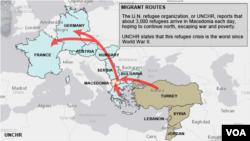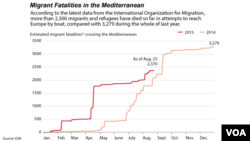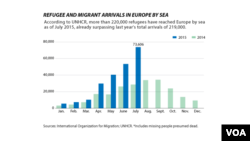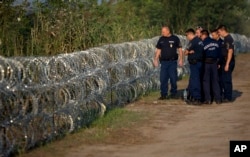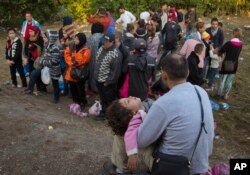German Chancellor Angela Merkel called on other countries in Europe Monday to do more to share the burden of the thousands of migrants streaming into the continent, but some of Germany's neighbors are resisting her appeal.
"If Europe fails on the question of refugees," the German leader said in Berlin, "if this close link with universal civil rights is broken, then it won't be the Europe we wished for."
Germany has accepted more refugees than any other European country, a total that could reach 800,000 by the end of the year. Slovakia, the Czech Republic, Hungary and Poland, however, are among countries that have blocked a plan for European Union member states to accept specific numbers of refugees.
Quota disagreement
Slovakia's Prime Minister Robert Fico said his country "will never agree" to a quota on the number of refugees it will accept. He said most of the migrants heading to Europe from war-wracked countries in the Middle East and Africa are making the dangerous journey to Europe for economic reasons and should be returned to their homelands.
French Foreign Minister Laurent Fabius on Sunday accused eastern European states, particularly Hungary, of "scandalous" policies toward migrants that go against European Union values. Budapest is building a four-meter fence along its southern border with Serbia to keep migrants from crossing into Hungary.
Hungary's state secretary, Levente Magyar, told the national news agency that the government rejected all "mean adjectives and accusations" made by Fabius.
The head of the International Organization for Migration, General William Lacy Swing, said aid groups like his are willing to help European governments deal with the influx of migrants, but that some parts of Europe needed to overcome the "fear factor" about accepting the refugees.
Austria blocked a Munich-bound train at the Hungarian border Monday as authorities searched for human traffickers and questioned whether 300 to 400 migrants on board, many from Syria, had proper credentials to continue their trip into the European heartland.
Vienna tightened its security checks after the bodies of 71 migrants were discovered last week in Austria in an abandoned truck.
The interior ministers of Britain, France and Germany called Sunday for urgent action to address the challenges of thousands of migrants flowing into Europe.
Luxembourg said it will convene talks involving home and justice ministers from EU member states on September 14 in Brussels in order to "strengthen the European response."
Tightened borders
Germany has implemented vehicle inspections on some border highways.
Hungary this year has detained approximately 160,000 migrants, many of whom hope to seek asylum in wealthier EU countries such as Germany and Sweden.
Greece’s coast guard on Monday said it had collected 2,492 people in 70 operations conducted along its eastern islands from Friday morning through Monday morning. Another 13 were pulled from the water near the island of Chios, including one person who was unconscious and had to be hospitalized, the AP reported.
When Macedonian authorities briefly halted border crossings Monday into Greece, the crowd surged forward, prompting Greek police to fire a stun grenade to head off a stampede, the AP reported. Border crossings resumed once order was restored.
EU ministers to meet
On Sunday, the interior ministers of Britain, France and Germany – Theresa May, Bernard Cazeneuve and Thomas de Maiziere, respectively – issued a joint statement asking current European Union president Luxembourg for a meeting to address the challenges of thousands of migrants flowing into Europe.
Luxembourg said it will convene the talks involving home and justice ministers from EU member states on September 14 in Brussels.
Labeling the situation as "exceptional," the ministers called for better processing of migrants in Italy and Greece, which the International Organization for Migration said are the main landing points for more than 322,000 migrants who have crossed the Mediterranean this year.
According to the IOM, the largest populations arriving in Greece and Italy came from Syria, Afghanistan, Eritrea and Nigeria.
The ministers recommend a system that would identify those clearly in need of protection due to the situation in their home country, as well as determining a list of "safe" countries to protect refugees and ensure the safe return of those denied asylum.
While some European leaders have advocated a more welcoming approach, others have not embraced the influx of migrants.
Hungary's right-wing Prime Minister Viktor Orban said he is taking a hard line on migrants because he said they pose a threat to European security, prosperity and identity.
Building a fence
Hungary is building a 4-meter fence on its southern border with Serbia in an effort to block the migrants from reaching the EU, which allows passport-free passage among its 28 member nations.
Earlier this month, Macedonia declared a state of emergency in response to daily border crossings from Greece of some 3,000 migrants pushing toward western European countries.
On Sunday, about 500 migrants boarded a train that leaves twice a day from the southern Macedonian town of Gevgelija headed for the northern border where they can cross into Serbia.
From Serbia, as the migrants continue on their Balkan route to western Europe, the next country is Hungary.
Hungary requires the migrants to be fingerprinted before entering temporary camps, causing concern for some.
Mark Kekesi, a volunteer with the advocacy group Migrant Solidarity, said the migrants "are afraid of the Hungarian fingerprint regime because they are well aware of the fact that if their fingerprint is recorded in Hungary, then, legally, there is the opportunity for any western European country to send them back to Hungary."
Bottleneck
Hungary has become a bottleneck on the journey to the more affluent western European countries because it has been holding on to the migrants, even when western European countries have said they are willing to accept thousands.
Germany said 800,000 migrants could settle there this year, considerably more than a year ago.
More than 2,400 people have drowned while trying to cross the Mediterranean this year, and authorities expect those tolls, as well as fatalities from land smuggling, to increase.
Pope Francis on Sunday decried the deaths of 71 migrants in an abandoned truck in Austria last week, calling it an offense against "the entire human family."
"We entrust each of them to the mercy of God," the pontiff said in Rome, calling on world leaders "to cooperate with effectiveness to prevent these crimes."
Arrest in deaths
Meanwhile, Hungary said it has arrested a fifth suspect, a Bulgarian, on suspicion of human trafficking in connection with the deaths of the 71 migrants, whose bodies were found in a refrigeration truck left behind on a highway.
Three other Bulgarians and an Afghan already had been arrested.
Information from The Associated Press contributed to this report.

